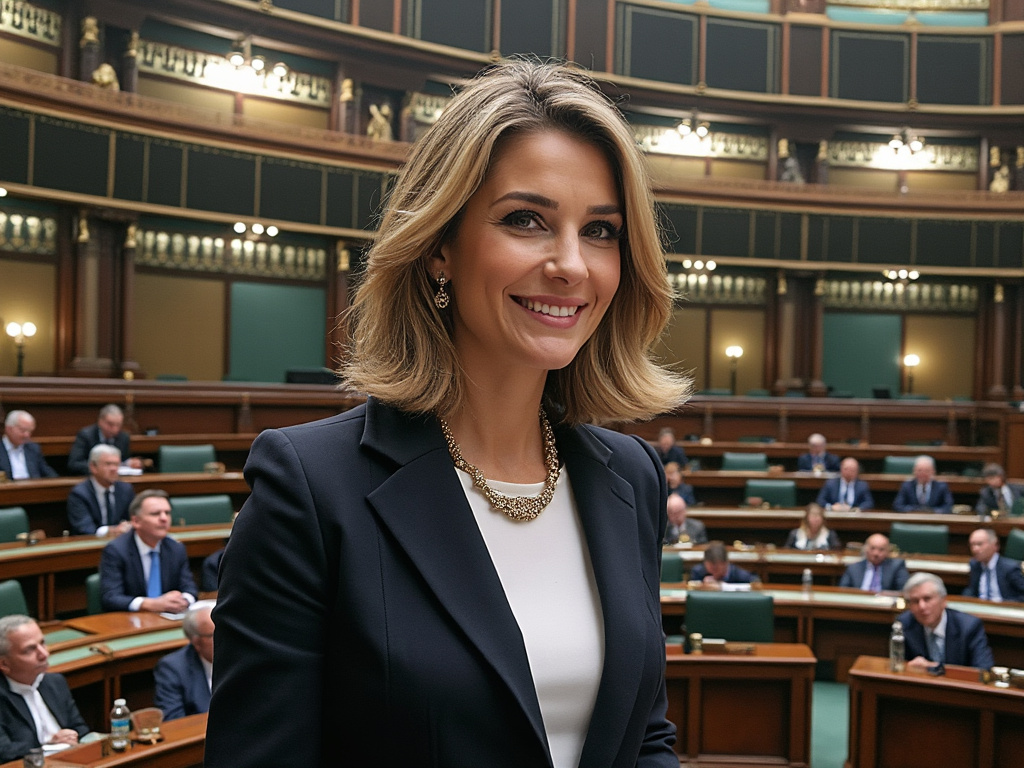
Sinn Féin Calls for Resignation of Irish Parliament Speaker Amidst Political Crisis
Tensions escalate in the Dáil Éireann as opposition parties challenge the impartiality of Speaker Verona Murphy following controversial parliamentary maneuvers.
DUBLIN — The political climate in Ireland's Dáil Éireann has intensified as Sinn Féin and several opposition leaders have publicly demanded the resignation of Speaker Verona Murphy, appointed just three months prior.
Mary Lou McDonald, the leader of Sinn Féin, stated that her party anticipates Murphy's resignation by the end of the week, failing which they are prepared to propose a formal no-confidence motion.
The demand for Murphy's resignation arises from accusations of bias following her decision to permit a government motion that created new speaking slots for the Regional Independents, a group crucial for the coalition government's majority.
The controversy escalated on Tuesday, when Murphy overrode opposition efforts to block this vote, prompting claims of partisanship from McDonald and other opposition leaders.
In response to these developments, Prime Minister Micheál Martin condemned Sinn Féin's approach, particularly highlighting their tactics that have previously delayed parliamentary proceedings.
Martin asserted that such intimidation tactics would not be successful in compelling Murphy's resignation, emphasizing a commitment to resisting what he termed a campaign of 'total opposition' by Sinn Féin.
According to parliamentary tradition, the Speaker of the Dáil Éireann is expected to maintain political neutrality and command respect from both government and opposition parties.
Historically, if a major party loses confidence in the Speaker, resignation is customary.
However, this instance may deviate from precedent, with potential repercussions for parliamentary function.
The tensions reached a peak when McDonald accused Murphy of undermining Dáil rules to favor the government's agenda, suggesting her actions were motivated by a 'deal brokered' by influential Regional Independent legislator Michael Lowry, linking Murphy's support to her previous role in their faction.
As the situation unfolded, Murphy attempted to address opposition disruptions during parliamentary sessions, ultimately releasing a statement defending her role.
She denounced the ongoing disorder and accusations of partiality, reaffirming her commitment to uphold the responsibilities of her office.
Martin voiced concerns over this emerging trend of opposition strategies, suggesting that it poses a threat to Ireland's democratic processes.
He recalled Sinn Féin's historical reluctance to accept the legitimacy of the Republic of Ireland's government, emphasizing the party's long-standing contentious relationship with state institutions.
Should Murphy remain in her position through the week, Sinn Féin is set to formalize their no-confidence motion in Tuesday's session, with support anticipated from other opposition groups, including the Labour Party and the Social Democrats.
However, while this coalition holds a majority in votes for such a motion, it is unlikely to succeed in removing Murphy from her position, marking a notable moment in the parliament's operational dynamics.
Mary Lou McDonald, the leader of Sinn Féin, stated that her party anticipates Murphy's resignation by the end of the week, failing which they are prepared to propose a formal no-confidence motion.
The demand for Murphy's resignation arises from accusations of bias following her decision to permit a government motion that created new speaking slots for the Regional Independents, a group crucial for the coalition government's majority.
The controversy escalated on Tuesday, when Murphy overrode opposition efforts to block this vote, prompting claims of partisanship from McDonald and other opposition leaders.
In response to these developments, Prime Minister Micheál Martin condemned Sinn Féin's approach, particularly highlighting their tactics that have previously delayed parliamentary proceedings.
Martin asserted that such intimidation tactics would not be successful in compelling Murphy's resignation, emphasizing a commitment to resisting what he termed a campaign of 'total opposition' by Sinn Féin.
According to parliamentary tradition, the Speaker of the Dáil Éireann is expected to maintain political neutrality and command respect from both government and opposition parties.
Historically, if a major party loses confidence in the Speaker, resignation is customary.
However, this instance may deviate from precedent, with potential repercussions for parliamentary function.
The tensions reached a peak when McDonald accused Murphy of undermining Dáil rules to favor the government's agenda, suggesting her actions were motivated by a 'deal brokered' by influential Regional Independent legislator Michael Lowry, linking Murphy's support to her previous role in their faction.
As the situation unfolded, Murphy attempted to address opposition disruptions during parliamentary sessions, ultimately releasing a statement defending her role.
She denounced the ongoing disorder and accusations of partiality, reaffirming her commitment to uphold the responsibilities of her office.
Martin voiced concerns over this emerging trend of opposition strategies, suggesting that it poses a threat to Ireland's democratic processes.
He recalled Sinn Féin's historical reluctance to accept the legitimacy of the Republic of Ireland's government, emphasizing the party's long-standing contentious relationship with state institutions.
Should Murphy remain in her position through the week, Sinn Féin is set to formalize their no-confidence motion in Tuesday's session, with support anticipated from other opposition groups, including the Labour Party and the Social Democrats.
However, while this coalition holds a majority in votes for such a motion, it is unlikely to succeed in removing Murphy from her position, marking a notable moment in the parliament's operational dynamics.











